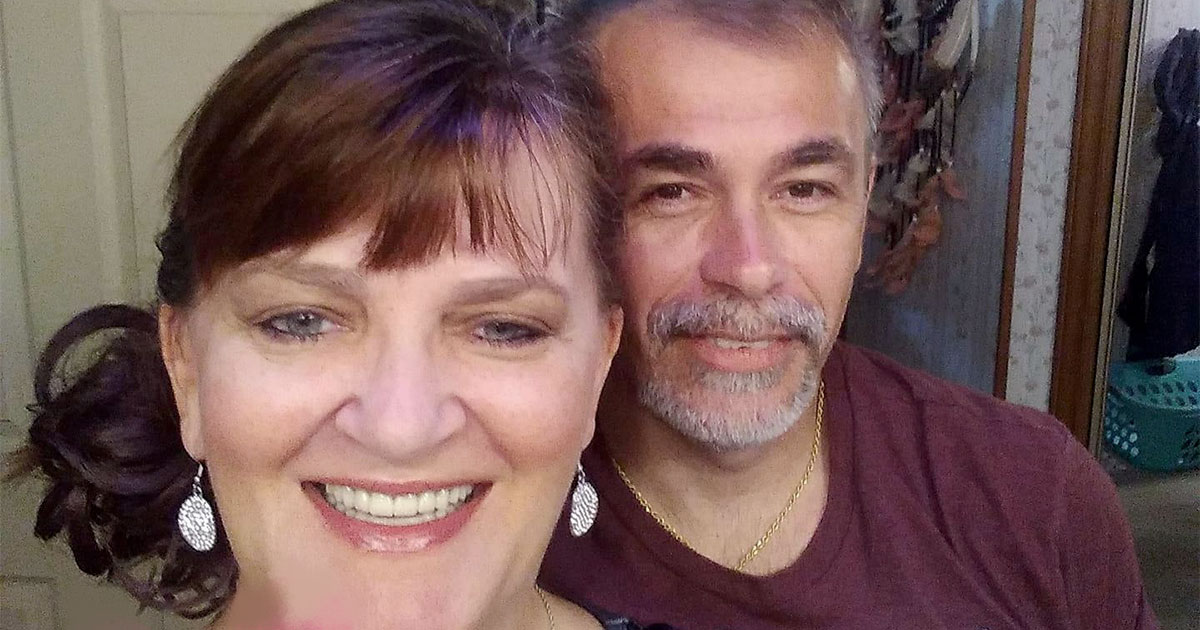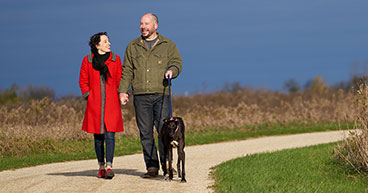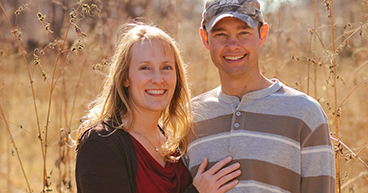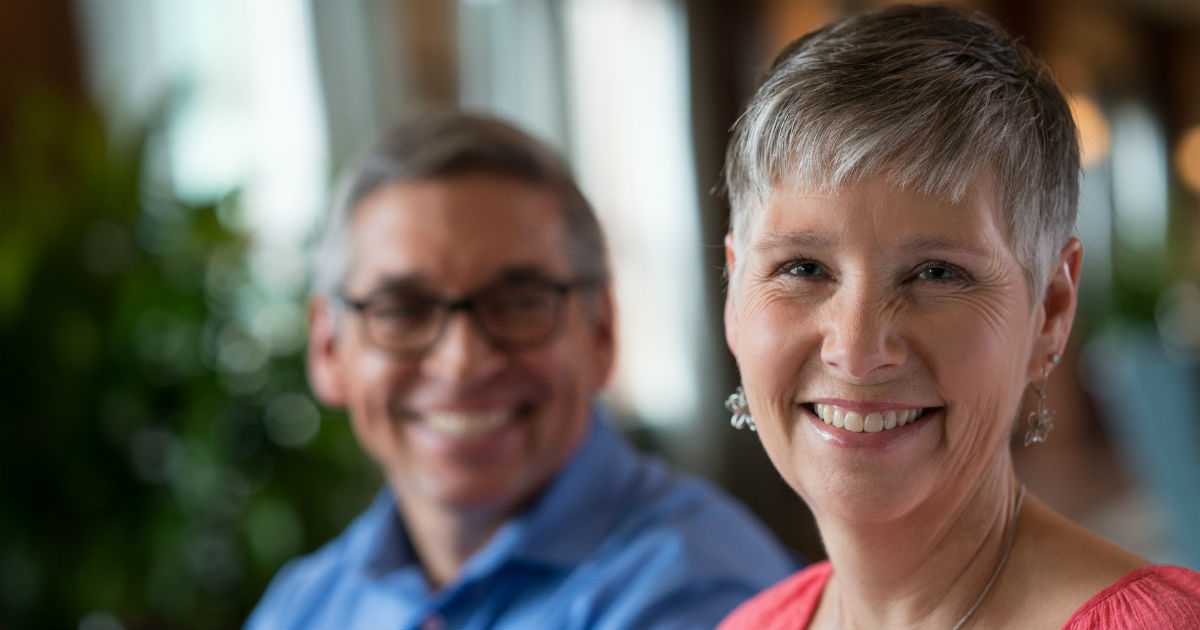
Wedding vows are often tested. The promise to love “for richer or poorer” may be difficult when the bank account runs low or a spouse loses a job. An oath to remain loyal “for better or for worse,” may be in jeopardy during the ebb and flow and ups and downs of a long marriage. The vow to have and to hold “in sickness and in health” is certainly challenged when one partner is diagnosed with cancer. When that happens, a partner becomes so much more: secretary and scheduler, health care advocate, nurse, chauffer—in other words, caregiver.
Just ask Kelli B. When she and Martin married in 2012, they didn‘t expect that more than half of their time together would be spent battling colorectal cancer, Martin as the patient and Kelli as the caregiver. While working full time as a nurse, Kelli accompanied Martin to every medical appointment and procedure. She had lost both parents to terminal illness and didn’t want to risk losing Martin, too.
“We signed up to support each other in sickness and in health,” she says. “And that’s what we did.”
A difficult diagnosis
Before they were married, Martin had been medically disabled after undergoing back surgery. In the years after saying their vows, the couple visited specialist after specialist trying to find relief as Martin’s pain worsened. He was diagnosed with hemorrhoids, then irritable bowel syndrome, but despite anti-inflammatory and pain medications, his pain persisted and escalated.
The couple moved from Upstate New York to South Carolina, hoping the warmer climate would bring him some relief. They also wanted to be closer to family (the couple share five children and three grandchildren) for support as Martin’s health continued to deteriorate. He says he went into stage 3 kidney failure at one point, which he attributes to the lengthy use of pain medication.
By 2016, Martin was unable to sit upright and was experiencing rectal bleeding. He didn’t share all his symptoms with Kelli, who has three decades of experience as a nurse. But she recognized that her husband’s condition needed immediate medical attention and urged him to request a colonoscopy.
Like many men faced with difficult symptoms, Martin was reluctant and put off the screening. “He was scared to get a rectal exam, as most men are,” Kelli said. “But we talked him into it. And from then on, it was a whirlwind.”
One in three people are not up to date with his or her colorectal cancer screening recommendations, despite the availability of affordable, at-home tests, according to the U.S. Centers for Disease Control and Prevention (CDC).
Colorectal cancer is the second leading cause of death among cancers common to men and women. Yet, according to the advocacy group FightCRC.org, an estimated 60 percent of colorectal cancer deaths may be prevented with screening. Colonoscopies, the gold standard of colorectal cancer screenings, are designed to find precancerous polyps—abnormal growths in the colon or rectum—that can be removed before they turn into cancer. Screenings, such as fecal tests may also help find colorectal cancer at an early stage, when more and less-invasive treatments are available, according to the CDC.
In 2018, Martin’s doctor found a firm mass inside his left buttock during an examination. A colonoscopy confirmed his diagnosis as stage 4 colorectal cancer, and emergency surgery was planned for two days later.
Having just started a new job, Kelli was unable to get a day off that quickly. When she asked whether the operation could be pushed back a day or two, the surgeon responded that Martin’s chances of survival were bleak.
Feeling overwhelmed and like their hopes for enjoying retirement and their grandchildren together had been stripped away, the couple sought a second opinion at Cancer Treatment Centers of America® (CTCA), Atlanta.
The journey begins
After deciding to seek treatment at CTCA®, Kelli and Martin’s respective cancer journeys began in earnest—his as patient, hers as caregiver. With Martin unable to sit because of the pain, Kelli put on her driver’s hat and made the three-hour drive from South Carolina to CTCA Atlanta with Martin stretched out in the back seat.
Once there, diagnostic tests revealed Martin’s colorectal cancer had metastasized to his liver. His oncologists developed a care plan that included chemotherapy to shrink the tumors, followed by radiation therapy, then surgery to remove part of his liver.
While undergoing treatment, Martin took advantage of supportive care services, including pain management, nutritional support and behavioral health support. He also underwent genetic testing to learn whether he carried a genetic mutation for cancer that could have been passed on to his children and grandchildren. The results were negative.
During Martin’s treatments, Kelli’s role shifted to patient advocate, talking to his doctors and nurses about his care and treatment options. Her advice to cancer caregivers is to ask questions until you understand your loved one’s diagnosis, the treatment plan and possible side effects.
“If you don’t fully understand something, keep asking until you do,” Kelli says. She also feels strongly that you must believe in the treatment plan laid out by your care team. “If you don’t, seek a second opinion. You have to trust your care team to get through this. But most importantly, you need hope.”
Here are some tips caregivers can follow to help ease the stress:
- Develop a support network, either online or in person. It’s valuable to talk with others who are similarly situated.
- Be aware of your own physical and psychological needs. Be mindful of your diet, and make time to exercise.
- Take a break when you can. Go out with friends, go shopping or see a movie. Do things you enjoy.
- Don’t be hard on yourself. It’s OK if you’re not always smiling and cheerful.
- Ask for help, and accept help when offered.
- Be open to talking to your partner about how you feel, and encourage the patient to do the same.
- Engage in activities with the patient that are unrelated to cancer. Play cards or a board game or make popcorn and watch a favorite TV show.
Finding a way to give back
Another important support resource for Kelli and Martin has been Cancer Fighters®, a network of volunteer CTCA cancer survivors, patients and caregivers who share their experiences and help new patients know what to expect before, during and after their cancer journey.
Martin attended several Cancer Fighters events at the hospital when visiting for treatments and developed strong friendships, including becoming so close with one member that he says he was “like a father.”
“I could talk to him about anything,” Martin says. “In fact, he encouraged me to vent.”
Martin and Kelli recommend talking to as many cancer patients and caregivers as possible while going through treatment, whether through online support groups (see a list here) or in person at your hospital or treatment center. Kelli and Martin are able to learn and share practical coping tips while also finding and giving emotional support through Cancer Fighters. “It’s important to talk to people outside your immediate family,” Kelli says. “Only another cancer patient or caregiver really understands what you’re going through.”
Martin and Kelli say they’re grateful they were able to find the source of Martin’s pain and do something about it. “It’s a miracle that I’m still on this Earth. I’m gaining weight and feeling better than ever,” Martin says. “I believe God has me here for a reason. I’ve been given a miraculous gift, and I want to share it with others, as others have done for me.”
Martin has also come to realize the burden Kelli bore as his caregiver and the sacrifices she made while he was battling the impact of his disease and being shuttled from tests to treatments.
“That first trip and the nine days of testing at CTCA are just a blur to me now,” Martin says. “Maybe I blocked it out or I was just in so much pain; I wasn’t really with it. It still breaks my heart that I wasn’t able to comfort my wife during that time.”



